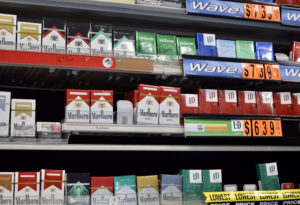The U.S. states that have banned or heavily restricted vaping product sales have seen increases in combustibe cigarette sales, according to the latest research. The study titled “Impact of Banning Electronic Nicotine Delivery Systems on Combustible Cigarette Sales: Evidence from US State-Level Policies,” said cigarette sales increased by up to 7.5 percent in one state that imposed a full ban on electronic nicotine delivery systems (ENDS).

According to the study, published in the medical journal Value in Health, found that a full ban on ENDS was associated with increased cigarette sales of 7.5 percent in Massachusetts and banning non-tobacco flavored ENDS was associated with a minimum of a 4.6 percent increase in cigarette sales among the US states outlawed most flavors (Massachusetts, Washington, and Rhode Island).
ENDS are considered by many to be an alternative nicotine product for adult smokers, and banning them may have unintended consequences, according to the authors of the study. “Cigarette sales in states banning ENDS were significantly higher than would have been observed otherwise,” researchers Yingying Xu, Lanxin Jiang, Shivaani Prakash, and Tengjiao Chen stated in the study, adding that commercial sales data provided the evidence that banning e-cigarettes was associated with increased sales of traditional cigarettes.
The authors looked at cigarettes sales data in 2020 following the start of restrictions on vaping in several states in the U.S. in the fall of 2019 that were imposed in several states following the outbreak of the e-cigarette or vaping product use-associated lung injury (EVALI), which was caused by illegal THC products and not nicotine vaping products.
The researchers also stated that the results “highlight and quantify potential unintended consequences” of ENDS sales restrictions, and the study’s results should be considered in the future as part of public health impact analyses of such policies.
“Additional research is also needed to investigate the impact on spatial spillover effects, illicit markets, and other scenarios that may arise in response to ENDS restrictions. Furthermore, the long-term impact of ENDS sales bans on ENDS and cigarette sales, as well as the distal public health outcomes, will need to be studied as additional data become available,” the report states.

